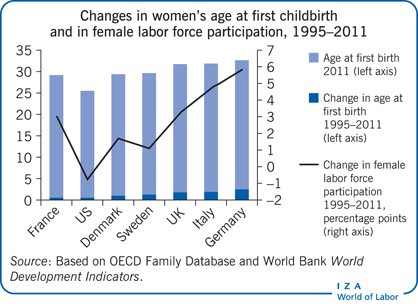Elevator pitch
The rise in the average age of women bearing their first child is a well-established demographic trend in recent decades. Postponed childbearing can have important consequences for the mother and, at a macro level, for the country as a whole. Research has focused on the effect postponing fertility has on the labor market outcomes for mothers and on the total number of children a woman has in her lifetime. Most research finds that postponing the first birth raises a mother’s labor force participation and wages but may have negative effects on overall fertility, especially in the absence of supportive family-friendly policies.

Key findings
Pros
Postponing childbearing helps women accumulate more work experience (human capital).
Postponing childbearing strengthens women’s attachment to the labor market and raises wages.
Family-friendly policies can mitigate the negative effects of postponing childbearing on total fertility.
Egg freezing and in-vitro fertilization may help women who delay motherhood bear children at an older age.
Cons
Postponing childbearing may have negative consequences on women’s total fertility.
It is difficult to assess the causal effects of postponing childbearing because of unobserved differences among women.
Cross-country comparative research is lacking on the impact of family-friendly policies on the motherhood wage and employment penalties.
More research is needed to assess the unintended consequences of egg freezing and in-vitro fertilization, such as further postponement of childbearing.